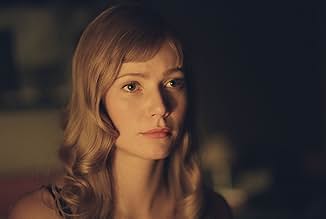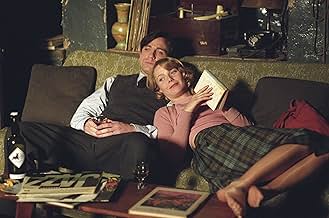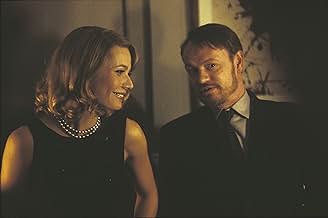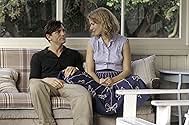IMDb-BEWERTUNG
6,3/10
11.494
IHRE BEWERTUNG
Füge eine Handlung in deiner Sprache hinzuStory of the relationship between poets Edward James "Ted" Hughes and Sylvia Plath.Story of the relationship between poets Edward James "Ted" Hughes and Sylvia Plath.Story of the relationship between poets Edward James "Ted" Hughes and Sylvia Plath.
- Auszeichnungen
- 1 wins total
Empfohlene Bewertungen
When I rented this movie, I thought it would be about Sylvia's entire life, or at least starting from her days at Smith College. I didn't realize that her marriage with Ted Hughes would be the entire storyline. I think this movie would've been better had they shown more about Plath's life BEFORE Ted Hughes. For people who don't really know much about Plath and her poetry, understanding her life before Hughes would've made the film much more substantial. The audience has to realize that Plath led a very, very hard mental life even before she met Hughes, and her ideas for her poetry and 'The Bell Jar' mostly originated from her bachelorette days. She never recovered from her depression as a young woman and it branched out still as she married Hughes. Without understanding Plath from the beginning hinders the audience from understanding Plath at all.
I feel like the movie only told half the story. Plath's mind was beautiful, colorful, and brilliant. It wasn't just about the jealousy, depression, and paranoia. Putting her works on the back burner really took away most of this movie. I would've liked to see more narration by Plath and giving us an insight into her mind, the way her unabridged journals do. However, I really enjoyed the dialogue of this movie; the lines were poetic and beautiful.
Unfortunately, I am still waiting for a better Sylvia Plath movie. I recommend people to read 'The Bell Jar' and 'Ariel' before or after seeing this movie though.
I feel like the movie only told half the story. Plath's mind was beautiful, colorful, and brilliant. It wasn't just about the jealousy, depression, and paranoia. Putting her works on the back burner really took away most of this movie. I would've liked to see more narration by Plath and giving us an insight into her mind, the way her unabridged journals do. However, I really enjoyed the dialogue of this movie; the lines were poetic and beautiful.
Unfortunately, I am still waiting for a better Sylvia Plath movie. I recommend people to read 'The Bell Jar' and 'Ariel' before or after seeing this movie though.
What is it about an artist dying young - particularly if it is at his or her own hands - that strikes such a deep chord in so many of us? Is it the fact that this rare and special person achieves a kind of mastery of fate at the last moment, a perfect conclusion to this messy business of life that we mere mortals can never hope to attain? Could it be that this early death is just one more instance of an artist taking the elements of raw reality and transforming them into something stylized, transcendent and meaningful for the rest of us to brood over and contemplate? When poet and novelist Sylvia Plath committed suicide in 1963, she became the archetype of the tortured artist - particularly for sensitive young people who came to romanticize her end and her suffering in ways that lifted her and her work to iconic status.
The biopic, entitled simply 'Sylvia,' gets the 'tortured' part pretty much right, but has considerably less success with the 'artist.'
The film focuses mainly on the tumultuous relationship between Plath and her husband of eight years, famed poet Ted Hughes. The story begins in 1956 with their love-at-first-sight meeting when they were both students at Cambridge University. The film moves quickly through the years, showing how, after a short period of relative marital bliss, Ted's philandering began to take its toll on the relationship. As portrayed in the movie, Sylvia, despite her notable talent, is a mass of neuroses and insecurities, always toiling in the shadows of her (initially at least) much more well known and commercially successful husband. But her feelings of inadequacy and jealousy over Ted's infidelities cannot, in and of themselves, entirely account for her paranoia, her outbursts of anger and her suicidal tendencies. Those resulted mainly from the clinical depression that tormented the woman from the time of her father's death early in her childhood to her own tragic end. The movie sidesteps the electroshock therapy Plath underwent at various times in her life (though it very subtly hints at them), yet the film still manages to convey just how great a victim she was of this disease she could not overcome.
Thanks to John Brownlow's rather singlemindedly depressing screenplay, there's a tremendous feeling of sadness hovering over the film. Director Christine Jeffs brings a raw intensity to many of the confrontation scenes involving the pain-wracked, benighted couple. As Sylvia and Ted, Gwyneth Paltrow and Daniel Craig give rich, moving and sensitive performances, and Michael Gambon leaves his mark as a sympathetic neighbor who tries but does not succeed at saving Sylvia.
If there is a flaw in 'Sylvia,' it is one common to films that attempt to portray the lives of artists, particularly writers. Although a scenarist can dramatize the details of an artist's life, it is virtually impossible for him to capture the richness and power of the art itself in the different medium of film. We never get the sense of how Sylvia either overcomes the difficulties of her life to succeed in her writing or how she uses those difficulties to enhance her art. What we do get is a few shots of Sylvia sitting in front of a typewriter, a comment or two about a book that has been or is soon to be published, a few references to critical reviews, and a smattering of voice-over recitations of Plath's poetry. What we don't get and what it is virtually impossible for film to capture is the essence of the writing itself. For this, one needs to return to the source material, the works that have lived on after the woman herself all these years. If the movie inspires new people to explore Sylvia Plath's writing, it will not have been in vain
The biopic, entitled simply 'Sylvia,' gets the 'tortured' part pretty much right, but has considerably less success with the 'artist.'
The film focuses mainly on the tumultuous relationship between Plath and her husband of eight years, famed poet Ted Hughes. The story begins in 1956 with their love-at-first-sight meeting when they were both students at Cambridge University. The film moves quickly through the years, showing how, after a short period of relative marital bliss, Ted's philandering began to take its toll on the relationship. As portrayed in the movie, Sylvia, despite her notable talent, is a mass of neuroses and insecurities, always toiling in the shadows of her (initially at least) much more well known and commercially successful husband. But her feelings of inadequacy and jealousy over Ted's infidelities cannot, in and of themselves, entirely account for her paranoia, her outbursts of anger and her suicidal tendencies. Those resulted mainly from the clinical depression that tormented the woman from the time of her father's death early in her childhood to her own tragic end. The movie sidesteps the electroshock therapy Plath underwent at various times in her life (though it very subtly hints at them), yet the film still manages to convey just how great a victim she was of this disease she could not overcome.
Thanks to John Brownlow's rather singlemindedly depressing screenplay, there's a tremendous feeling of sadness hovering over the film. Director Christine Jeffs brings a raw intensity to many of the confrontation scenes involving the pain-wracked, benighted couple. As Sylvia and Ted, Gwyneth Paltrow and Daniel Craig give rich, moving and sensitive performances, and Michael Gambon leaves his mark as a sympathetic neighbor who tries but does not succeed at saving Sylvia.
If there is a flaw in 'Sylvia,' it is one common to films that attempt to portray the lives of artists, particularly writers. Although a scenarist can dramatize the details of an artist's life, it is virtually impossible for him to capture the richness and power of the art itself in the different medium of film. We never get the sense of how Sylvia either overcomes the difficulties of her life to succeed in her writing or how she uses those difficulties to enhance her art. What we do get is a few shots of Sylvia sitting in front of a typewriter, a comment or two about a book that has been or is soon to be published, a few references to critical reviews, and a smattering of voice-over recitations of Plath's poetry. What we don't get and what it is virtually impossible for film to capture is the essence of the writing itself. For this, one needs to return to the source material, the works that have lived on after the woman herself all these years. If the movie inspires new people to explore Sylvia Plath's writing, it will not have been in vain
After viewing the film on Sylvia Plath, I felt a need to read about this poet and find out exactly what Hollywood did with it. As usual, Hollywood transformed a person's life into what an audience would want to be amused by. Mr. Hughes is personified as a womanizer and adulterer, the later of which may be true. After reading two biographies of Ms. Plath by Linda W. Wagner-Martin and Anne Stevenson and of course having studied Ms. Plath's poetry, I feel that the film, albeit entertaining does not depict her actual identity. It does a marginal account of her life, or part of her life. As any human being, Ms. Plath suffered from many demons. If you ascribe to an astrological standpoint (as Mr. and Mrs. Hughes did) you will find that Sylvia was doomed by her astrological sign, Scorpio. Those of you who are Scorpios know that there is a dark side to this sign. She set her expectations too high of most things and considered the failure of loyalty from her friends and family detrimental. Her experiences with depression only added fuel to the flame. Had she lived in modern times, maybe the newer therapies could have helped her. Depression is a severe affliction and may make a great poet, but for everyday living it can render a person helpless. It can make one helpless with dealing with marriage and children, life in general, and one's occupation. Sylvia Plath was a victim of her depression, her personality overreacting to life and her relationships. Unfortunately, she could not work her way through her inner problems and suffered the result of her mental blockage. Fortunately, for her children, they were unharmed by her mental illness and subsequent actions, and were eventually raised by their father. No one is to blame... no one is superhuman. If standards are set too high for anyone, as Sylvia set for herself, anyone is doomed to failure. We do have her poetry and novel(s) to see her inner self, which no film can properly depict.
What makes poetry a special art form? Answers might include bringing together extremes of joy and despair within a couple of lines, offering an alternative to rational thought, enriching our outlook and understanding in ways that prose would struggle to equal. Poetry can provide a single phrase or sentence that is easily remembered and somehow unlocks difficult-to-express inner states, just as a song can (and poetry is the basis of songs). It offers a freedom of expression where you don't need to explain every aspect of what you are saying - it urges the listener to grasp a semi-spoken truth or idea.
That's my rough guess. I've got over 40 books of poetry on my bookshelf at the last count, yet I'm no literary expert and appreciate poetry in a very simple way. Most people might agree that poetry offers something special, so a film celebrating the life of a famous poet might be expected to bring us a glimmer of that something.
Sylvia Plath has been championed not only as a poet but as a sort of feminist' a cry on behalf of women treated as a commodity, subjugated by an unfair male-dominated system. Cast in the lead role, Gwyneth Paltrow's Plath focuses much attention on how downtrodden she was, chained to two children, overshadowed by a brilliant and celebrated Ted Hughes, struggling with bitterness, jealousy, mental instability and a less than attractive persona. We also get the occasional poetic outburst, from who-can-recite-poetry-fastest undergrad shenanigans to romanticised performances of Chaucer (addressed to an audience of watching cows whilst floating downstream in a boat). All punctuated with soft-focus shots of a naked Plath/Paltrow, hysterical and often violent outbursts at Hughes, and scenes of a generally uninteresting and uninspiring life of moderate wretchedness. The only thing that distinguishes Sylvia from the now-unfashionable kitchen sink drama is that its central character is called Sylvia Plath.
So is the film worthy of the title? In A Beautiful Mind, we learnt of the joy of mathematics, Lunzhin Defence championed the addictive mysteries of chess, and Dead Poets Society made us lift our eyes to literary horizons that could inspire the dullest of minds. Sylvia was limited, perhaps, by the refusal of her daughter to allow much of Plath's poetry to be used in the film but, for whatever reason, it has failed to be more than a rather humdrum biopic. It offers little insight into her poetry or the magic of poetry generally, and adds little of interest about the historical figure that doesn't apply to millions of women. If any deep philosophical statement can be drawn from this, the film certainly doesn't make it, poetically or otherwise. Sadly, it would seem that the words of Sylvia Plath's daughter almost became a self-fulfilling prophecy: "Now they want to make a film . .. They think I should give them my mother's words . . . To fill the mouth of their monster . . . Their Sylvia Suicide Doll." Whilst not quite an empty doll, Sylvia is maybe an arm or leg short of a manikin.
That's my rough guess. I've got over 40 books of poetry on my bookshelf at the last count, yet I'm no literary expert and appreciate poetry in a very simple way. Most people might agree that poetry offers something special, so a film celebrating the life of a famous poet might be expected to bring us a glimmer of that something.
Sylvia Plath has been championed not only as a poet but as a sort of feminist' a cry on behalf of women treated as a commodity, subjugated by an unfair male-dominated system. Cast in the lead role, Gwyneth Paltrow's Plath focuses much attention on how downtrodden she was, chained to two children, overshadowed by a brilliant and celebrated Ted Hughes, struggling with bitterness, jealousy, mental instability and a less than attractive persona. We also get the occasional poetic outburst, from who-can-recite-poetry-fastest undergrad shenanigans to romanticised performances of Chaucer (addressed to an audience of watching cows whilst floating downstream in a boat). All punctuated with soft-focus shots of a naked Plath/Paltrow, hysterical and often violent outbursts at Hughes, and scenes of a generally uninteresting and uninspiring life of moderate wretchedness. The only thing that distinguishes Sylvia from the now-unfashionable kitchen sink drama is that its central character is called Sylvia Plath.
So is the film worthy of the title? In A Beautiful Mind, we learnt of the joy of mathematics, Lunzhin Defence championed the addictive mysteries of chess, and Dead Poets Society made us lift our eyes to literary horizons that could inspire the dullest of minds. Sylvia was limited, perhaps, by the refusal of her daughter to allow much of Plath's poetry to be used in the film but, for whatever reason, it has failed to be more than a rather humdrum biopic. It offers little insight into her poetry or the magic of poetry generally, and adds little of interest about the historical figure that doesn't apply to millions of women. If any deep philosophical statement can be drawn from this, the film certainly doesn't make it, poetically or otherwise. Sadly, it would seem that the words of Sylvia Plath's daughter almost became a self-fulfilling prophecy: "Now they want to make a film . .. They think I should give them my mother's words . . . To fill the mouth of their monster . . . Their Sylvia Suicide Doll." Whilst not quite an empty doll, Sylvia is maybe an arm or leg short of a manikin.
I am pretty familiar with Plath's story, and am also a keen fan of her work, which i think contributed to my hesitancy in seeing the film. I did not have high hopes for this film at all, and honestly, I have to say that I was pleasantly surprised.
My main criticisms:
I found it hard to get past the whole 'Oooh look it's Gwyneth Paltrow as Sylvia Plath'. Someone who isn't famous on a global scale would have been more credible.
The whole premise of the film hinges on the deep passionate relationship of Plath and Hughes, yet I never really felt convinced by it. The relationship came across as quite two dimensional, and even pretty one sided on the part of Paltrow/Plath. Instead of being portrayed as an emotionally fragile woman driven to the edge by Hughes' constant philandering and ultimate betrayal, Plath actually seemed to come across as being deeply insecure and neurotic, constantly suffering from extreme PMT, and overreacting every time she saw Hughes even talking to another woman, rather than having genuine reason to suspect his infidelity.
There were a couple of key dramatic moments (such as after they have made love for the first time, and when they are out in the boat together) that felt very hammy, so disrupted the momentum of the piece.
The score is just awful. Totally totally overwrought, over the top, too loud and too much of it. Plus, as Paltrow/Plath really starts to lose her mind there is an almost constant sound of howling wind in the backgroud. Again, OTT. Less definitely would have been more.
HOWEVER
Ok, I complained about Paltrow above, but she really did a great job. She really is a very talented actress, and it is a shame the whole celebrity thing gets in the way. She was particularly fine in the latter stages of the film, and the sad descent into loneliness and irreversible depression was very well judged.
Likewise, Daniel Craig was very enigmatic, although I wonder whether the one sidedness of the relationship as mentioned above may have come from him.
As a whole the film was very sympathetic, and showed how hard it must have been for Hughes to live with Plath. It doesn't justify his behaviour but rather tries to show an understanding. It also evokes a sense of a time when poets were considered important.
This film stayed with me for some days after watching it, and I would recommend it. It is somewhat uneven in pace and direction, but I think Christine Jeffs is a director with talent, although her inexperience showed. But above all, it renewed my interest in both Plath and Hughes.
7/10
My main criticisms:
I found it hard to get past the whole 'Oooh look it's Gwyneth Paltrow as Sylvia Plath'. Someone who isn't famous on a global scale would have been more credible.
The whole premise of the film hinges on the deep passionate relationship of Plath and Hughes, yet I never really felt convinced by it. The relationship came across as quite two dimensional, and even pretty one sided on the part of Paltrow/Plath. Instead of being portrayed as an emotionally fragile woman driven to the edge by Hughes' constant philandering and ultimate betrayal, Plath actually seemed to come across as being deeply insecure and neurotic, constantly suffering from extreme PMT, and overreacting every time she saw Hughes even talking to another woman, rather than having genuine reason to suspect his infidelity.
There were a couple of key dramatic moments (such as after they have made love for the first time, and when they are out in the boat together) that felt very hammy, so disrupted the momentum of the piece.
The score is just awful. Totally totally overwrought, over the top, too loud and too much of it. Plus, as Paltrow/Plath really starts to lose her mind there is an almost constant sound of howling wind in the backgroud. Again, OTT. Less definitely would have been more.
HOWEVER
Ok, I complained about Paltrow above, but she really did a great job. She really is a very talented actress, and it is a shame the whole celebrity thing gets in the way. She was particularly fine in the latter stages of the film, and the sad descent into loneliness and irreversible depression was very well judged.
Likewise, Daniel Craig was very enigmatic, although I wonder whether the one sidedness of the relationship as mentioned above may have come from him.
As a whole the film was very sympathetic, and showed how hard it must have been for Hughes to live with Plath. It doesn't justify his behaviour but rather tries to show an understanding. It also evokes a sense of a time when poets were considered important.
This film stayed with me for some days after watching it, and I would recommend it. It is somewhat uneven in pace and direction, but I think Christine Jeffs is a director with talent, although her inexperience showed. But above all, it renewed my interest in both Plath and Hughes.
7/10
Wusstest du schon
- WissenswertesFrieda Hughes, Sylvia Plath's daughter and literary executor, didn't allow the producers to access to her mother's poetry. She also publicly denounced the project in a published poem of her own.
- PatzerWhen Ted and Sylvia are in bed together and she is discussing her suicide attempt, you can clearly see Daniel Craig's tattoo through the make up on his shoulder and Gwyneth Paltrow's hair net to which her wig is attached.
- Zitate
Sylvia: [to Ted, after making love] We're not even two people. Even before we met, we were just these two halves, walking around with big gaping holes in the shape like the other person. And when we found each other we were finally whole. And then it was as if we couldn't stand being happy so we ripped ourselves in half again.
Top-Auswahl
Melde dich zum Bewerten an und greife auf die Watchlist für personalisierte Empfehlungen zu.
- How long is Sylvia?Powered by Alexa
Details
- Erscheinungsdatum
- Herkunftsland
- Sprache
- Auch bekannt als
- Ted and Sylvia
- Drehorte
- Produktionsfirmen
- Weitere beteiligte Unternehmen bei IMDbPro anzeigen
Box Office
- Budget
- 7.000.000 £ (geschätzt)
- Bruttoertrag in den USA und Kanada
- 1.315.498 $
- Eröffnungswochenende in den USA und in Kanada
- 58.940 $
- 19. Okt. 2003
- Weltweiter Bruttoertrag
- 2.917.393 $
- Laufzeit
- 1 Std. 50 Min.(110 min)
- Farbe
- Sound-Mix
- Seitenverhältnis
- 2.35 : 1
Zu dieser Seite beitragen
Bearbeitung vorschlagen oder fehlenden Inhalt hinzufügen




































